#PIRACY; PRIMITIVE ACCUMULATION OF CAPITAL
Crew Reported Kidnapped in New Incident in Gulf of Guinea
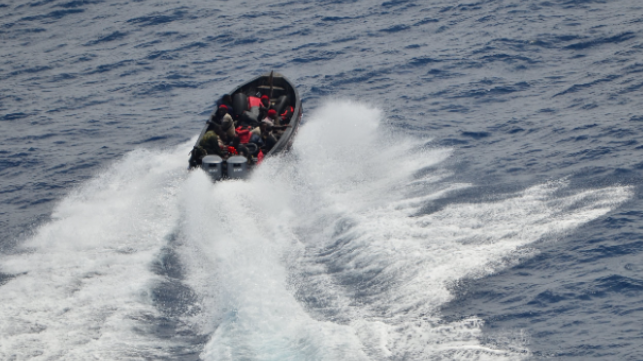
After a seeming lull in attacks of merchant ships in the Gulf of Guinea with the increased international presence in the region, a new attack with a kidnapping was reported today in the same vicinity of other attacks in the region off Equatorial Guinea. Alerts have gone out for the potential of further piracy activity in the region.
While the details remain scarce at this moment, security consultants Dryad International is reporting that it believed six crew members have been abducted in an incident in the same place where another vessel was involved in another kidnapping incident in late October. The monitoring operation MDAT-GoG first reported a suspicious approach after midnight saying that a skiff was spotted with 12 individuals aboard. This was happening in the anchorage area near the port of Owendo in Gabon. This prompted MDAT-GoG to issue a warning for “an increased high risk of piracy activity for the next 24 to 48 hours.”
Dryad reported that six crew members were abducted although some set the number as high as nine crew from a containership in the same area that the OSV Montet Tide was the target of an assault on October 25. The offshore supply vessel managed by Tidewater was boarded and three crew members were reported taken in the previous incident that took place hours before pirates attempted an incident with an MSC containership. The Russian Navy took credit for chasing away the boarders on the MSC Lucia before they could abduct any crew members and then together the vessel were seen proceeding to the site of the Monet Tide.
Today's incident happened about 35 nautical miles away from the October reports, MDAT-GoG reported that the vessel had been boarded but was secured. They also said that Gabon has dispatched forces to the area. In later reporting, the Danish frigate operating in the area said that it had sent its helicopter to the area and spotted the skiff but was unable to stop it after it entered territorial waters apparently heading toward the Niger Delta region. The Danes boarded the containership providing assistance including searching for unaccounted for crew members leading to the current confusion on the exact number kidnapped. The Danish frigate is also providing medical care for one crew member from the containership that was wounded in the confrontation with the pirates.
Dryad tallies 2021 assaults on vessels at 10 with a total of 76 individuals believed to have been kidnapped. Most of those, however, were early in 2021 before the increased efforts in recent months by the international forces.
After the incident in which a Danish frigate intercepted a skiff and returned fire killing four suspected pirates, Dryad had cautioned that it was unlikely to immediately affect the pirate attacks. The European Community Shipowners’ Association had cautioned that the threat remained high and called for additional international efforts to protect merchant ships.
Note: An earlier version of the report indicated that the OSV had been the target of the attack, but today's incident appears to have only involved the crew members from the containership with three additional people being from the prior attack on the OSV.
Danish Prosecutors Seek to Bring Gulf of Guinea Pirates Home for Trial
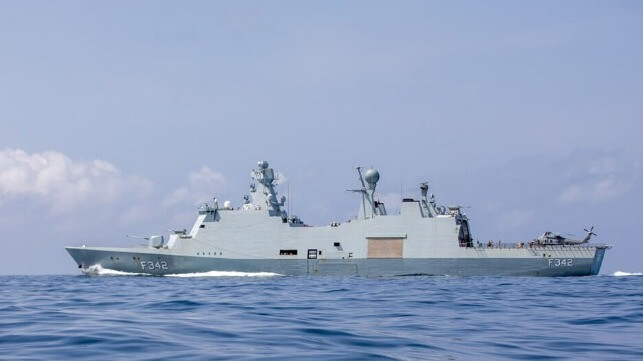
Danish prosecutors are looking for options to bring four captured pirates from the Gulf of Guinea to Denmark to face justice, and they are even examining the possibility of chartering a vessel to ship them all the way north.
On November 24, the Danish frigate Esbern Snare was on an antipiracy patrol in the Gulf of Guinea when her crew spotted a suspicious skiff in international waters. The crew launched a helicopter to investigate. The helicopter crew spotted equipment associated with piracy in the boat, including ladders, so the Snare gave pursuit and launched a boat with a boarding party. The suspected pirate skiff did not stop when ordered, so the Danish forces fired customary warning shots. In response, the skiff's occupants opened fire on the helicopter and the boarding party, putting seven holes in the Esbern Snare's launch.
The Danish forces returned fire, killing four of the skiff's occupants. One more individual went over the side and is unaccounted for, and four suspects were captured, including one with severe injuries to his leg. (The limb was later amputated by Snare's medical team.)
A Danish court has granted prosecutors' request to hold the survivors in custody in absentia. With an extension, Danish officials have until December 22 to bring the suspects before the court for trial. That would be a simple matter if the arrest had occurred in the Baltic, but the case is complicated by the Esbern Snare's location. Nearby West African states do not have legal arrangements in place for extradition by plane, nor could they provide certainty of local criminal prosecution under their own laws.
"[Bringing them] home is a big logistical and diplomatic task. It has also been investigated whether you can charter a ship and sail them home, but there are logistical and administrative challenges with that," said special prosecutor Karen Moestrup Jensen, according to Danish outlet DR.
If the suspected pirates are tried in a Danish court, their appointed attorney plans to argue that they shot at Danish forces in self defense - only after the Esbern Snare's helicopter crew fired the first warning shots.
Danish Anti-Piracy Action Jolts Gulf of Guinea Maritime Leaders
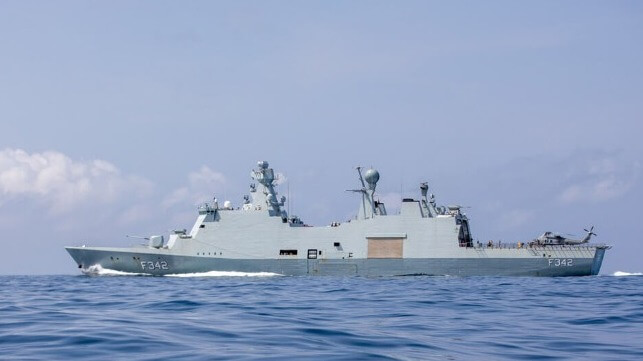
An intense debate has erupted following the recent deployment of a Danish frigate on an anti-piracy patrol in Gulf of Guinea, which resulted in the death of four pirates and the capture of another four.
West African defense analysts view the incident as a defining moment in the evolving maritime security situation in the Gulf of Guinea. This is the first time a foreign navy has resorted to lethal force in dealing with pirates in the region.
The operation happened 25 to 30 nautical miles south of Nigeria’s territorial boundary. Several international shipping associations have lauded the Danes’ response to a potential piracy activity; however, the action received a mixed reaction within some West African nations.
The Nigerian Maritime Law Association (NMLA) was the first to raise concerns over the incidence. According to a Nigerian newspaper Punch, NMLA’s leadership called for an independent inquiry that would look into the precise location of the incident in order to preserve Nigeria’s sovereignty.
“The Association supports all efforts to rid the Gulf of Guinea of piracy, maritime offences and all forms of criminality. It is concerned, however, about the sanctity of Nigeria’s sovereignty, application of the rule of law and respect of protocols of engagement with regard to the instant incident, and the emerging security regime in the Gulf of Guinea,” read the statement by NMLA.
Dr. Ifesinachi Okafar-Yarwood, a leading maritime security expert in the Gulf of Guinea, questions whether the Danish intervention may influence the nature of piracy attacks in future. “Could this see the increase in violence, as was the case in Somalia, which will justify a push for a Somalia styled response?” asks Dr. Okafor.
Amidst the debate over the role of international navies in anti-piracy operations, the region’s local governments must agree to face some realities, which may impede their efforts to stabilize the region.
Days before the Danish incidence happened, Amb. Florentina Ukonga, the Executive Secretary of the Angola-based Gulf of Guinea Commission (GGC), lamented that her organization consistently experienced lack of political commitment from leaders of the member countries. Amb. Ukonga was addressing participants in a virtual seminar held late last month as a prelude to Lagos International Maritime Week 2021.
Among other challenges, she noted the conflicting laws on security and safety at sea in the GGC countries.
“For instance, some countries do not have piracy laws; when pirates are caught, they are brought to the shores and let-off. But we do not want that to happen again. Nigeria has gotten an Act, the Suppression of Piracy Act of 2019, and we are proposing a code of conduct which should bind criminals when caught,” said Amb. Ukonga.
Dr. Dakuku Peterside, the immediate former Director of Nigerian Maritime Administration and Safety Agency (NIMASA), is another Gulf of Guinea maritime expert who has been pressing for a local solution to the region’s insecurity.
In March, a week after Denmark resolved to send a frigate to patrol the Gulf of Guinea, Dakuku penned an emotional letter in Nigeria’s Premium Newspaper saying that continued governance dysfunction in the Gulf of Guinea would have far-reaching implications to the status, stature and sovereignty of West African nations. According to Dr.Dakuku, this would be most pronounced for Nigeria, the largest economy in the jurisdiction.
“When small countries like Denmark provide security to Gulf of Guinea, what does that say about Nigeria’s image as Africa’s economic giant?,” asked Dr. Dakuku. :Nigeria built a strong reputation as a regional power within West Africa in the recent past. But with the current spate of insecurity and piracy, this reputation is gradually fading away. It is the high time Nigeria worked collaboratively with sister nations around the Gulf of Guinea to provide adequate security for the maritime sector.”
U.N. Security Council Explores Ending Somalia Anti-Piracy Resolution
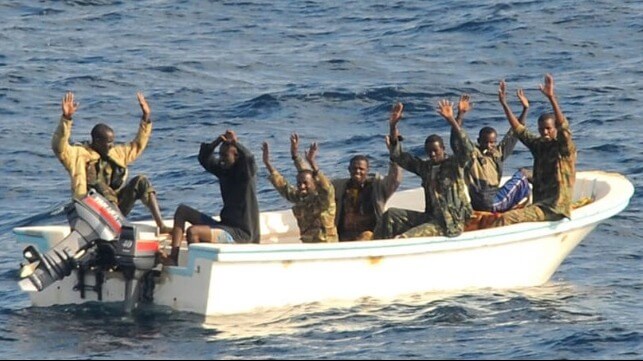
The U.N. Security Council appears to be preparing to officially bring to a close the more than a decade’s long mission for international naval forces fighting piracy off the Somali Coast in East Africa. The Council voted last week to only reauthorize the mission for three months, while cautioning that proper mechanisms needed to be in place to ensure that there would not be a resurgence in activity.
Recognizing the steady decline in attacks and hijackings since 2011 and saying although piracy off the coast of Somalia has been “repressed,” Security Council members however said that the ongoing threat of resurgence remains. The U.N. adopted its first resolution to fight Somali piracy nearly 15 years ago, with the European Union, U.S., and other naval forces launching their coordinated efforts in the region in December 2008. The Security Council has continued to reauthorize the mission annually despite the decline in activities. In debating the new resolution, the Security Council acknowledged that “there has been no successful hijackings for ransom reported since March 2017” commending the broad naval coalition and efforts of the African Union for their counter-piracy activities.
Somali representatives speaking before the Security Council also highlighted the success of the efforts saying that they believed the time had come to end the U.N. efforts and restore sovereignty to their waters. The Associated Press reported that Somalia’s U.N. Ambassador Abukar Dahir Osman told the council, “We believe that the Security Council resolutions on piracy and armed robbery off the coast of Somalia have successfully achieved its intended objective.”
Permanent members of the Security Council, however, spoke out regarding the dangers and saying that the mission remains a critical deterrent. The United States, which sponsored this year’s resolution, objected to efforts to end the resolution while France spoke of the potential “security vacuum,” saying it believed three months did not provide sufficient time to ensure a long-term structure to maintain stability in the region.
After negotiations between Somalia, the United States, and other council members, the resolution authorized for a further three-month period states and regional organizations cooperating with Somali authorities, to fight against piracy and armed robbery at sea off Somalia. The council called upon all states to “take appropriate actions…to prevent the illicit financing of acts of piracy and the laundering of its proceeds…[and] to criminalize piracy under their domestic law.”
The ambassadors said that investigations and prosecutions must continue for all who “plan, organize, illicitly finance or profit from pirate attacks off the coast of Somalia,” while also calling on Somalia to bring to justice those using Somali territory to launch the attacks. Among the efforts that the Security Council called for from Somalis is to put in place mechanisms to safely return effects seized by pirates and to patrol the coastal waters to prevent and suppress future acts of armed robbery at sea.
The Security Council said it expects to continue the discussions with Somalia and will also be looking for further resolution with the African Union to ensure that the long-term structure is in place for the stability of the region. Somalia, for its part, is proposing bilateral agreements starting in 2022 to replace the broader U.N. Security Council resolutions.
UN: Despite Lull in Attacks, Somali Pirate Threat is Still Real
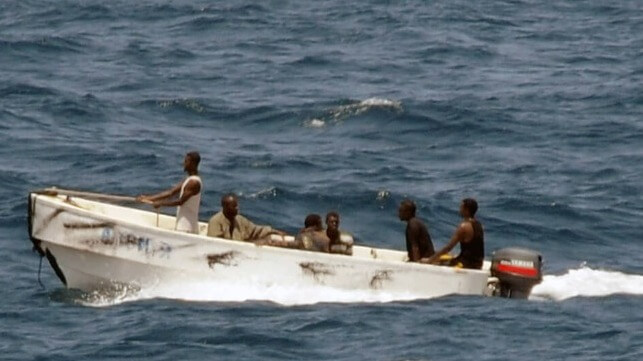
The United Nations has adopted a resolution for continuous vigilance against threats of maritime piracy and armed robbery on the coast of Somalia. Piracy networks remain active despite long-running suppression efforts.
Despite the infrequency of attacks in the region and the reduction of the designated High Risk Area (HRA) in August, a UN Secretary General report on the situation suggests that threats remain along the Indian Ocean coastline because pirate cells are still active.
In early November, the UN Security Council adopted a resolution condemning piracy and armed robbery at sea off the Somali coast and underscored that it exacerbates instability by introducing “illicit cash that fuels crime, corruption and terrorism.” The Council said that investigations and prosecutions must continue for all who “plan, organize, illicitly finance or profit from pirate attacks off the coast of Somalia.”
The UN Secretary-General’s latest report on the piracy situation in Somalia illustrates that joint counter-piracy efforts have resulted in a steady decline in attacks and hijackings since 2011, but notes that threats remain real.
The report - which covers the period from November 1 2020 to October 31 2021 - shows that no incidents of piracy were reported in the regional waters around the Somali coastline. However, an armed attack against a vessel occurred approximately three nautical miles off the coast of Middle Shabelle on August 13. Some member states also observed suspicious approaches towards merchant vessels in the region, indicating that progress achieved in combating piracy could be reversed if not consolidated.
“The continued absence of successful piracy attacks off the coast of Somalia demonstrates the effectiveness of the measures applied to combat piracy and armed robbery at sea . . . Nevertheless, the continued presence of pirate action groups and networks remain of concern and highlight that piracy has yet to be fully eradicated,” stated the report.
Multiple threats to maritime security remain, with piracy networks having shifted their focus to less risky activities - like smuggling, which also requires attention from the international community.
Though maritime piracy is at near-zero levels along Somali shores, illegal, unreported and unregulated fishing remains common. This crime is hindering multilateral efforts to foster sustainable fisheries.
Attacks attributed to Somali pirates peaked in 2011, when 237 incidents were recorded. The number fell dramatically to just 14 between 2015 and 2020, a drop widely regarded as a result of joint efforts to reduce crimes at sea.
No comments:
Post a Comment